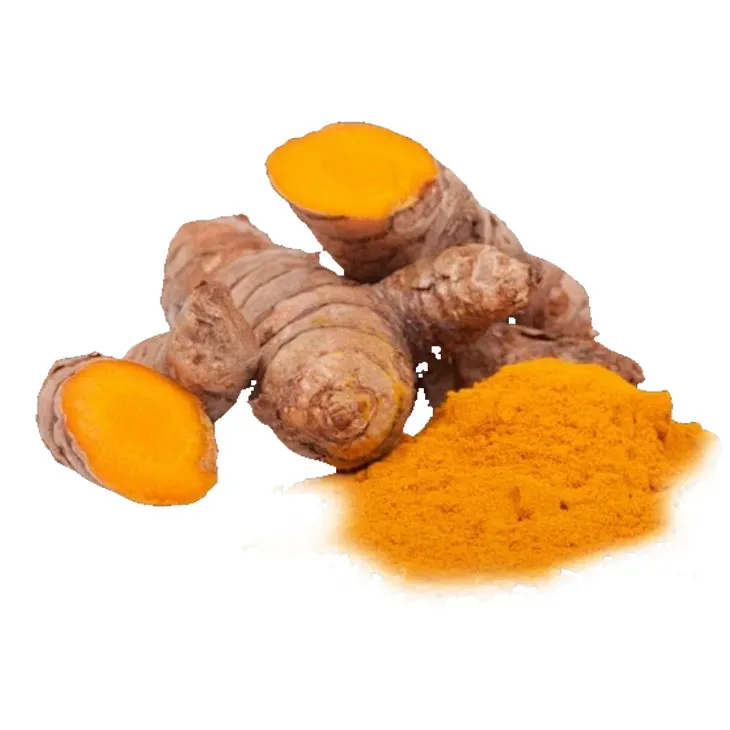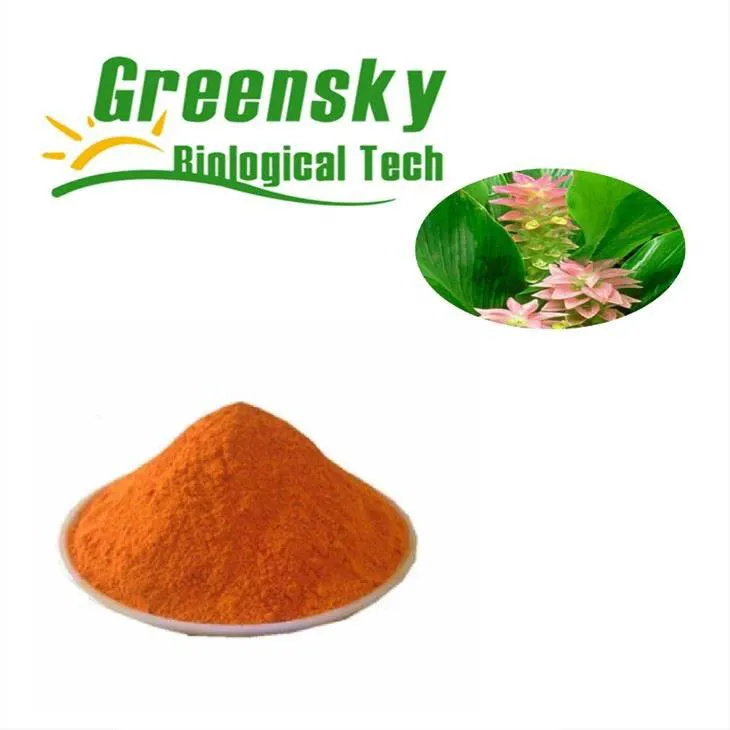- 0086-571-85302990
- sales@greenskybio.com
The Application of Curcumin in Skin Care.
2024-11-13

1. Introduction to Curcumin
Curcumin is a natural compound that is derived from turmeric, a plant that has been used in traditional medicine for centuries. Turmeric, known botanically as Curcuma longa, is a member of the ginger family. Curcumin gives turmeric its characteristic yellow color. It has a long history of use in Ayurvedic and traditional Chinese medicine for various health purposes. In recent years, its potential in skin care has been increasingly recognized.

2. Antioxidant Properties of Curcumin
2.1 Free Radical Scavenging
One of the most important aspects of curcumin's role in skin care is its antioxidant property. Antioxidants play a crucial role in protecting the skin from damage caused by free radicals. Free radicals are unstable molecules that are produced in the body as a result of various factors such as exposure to ultraviolet (UV) radiation, pollution, and smoking. These free radicals can cause oxidative stress, which in turn can damage skin cells, leading to premature aging, wrinkles, and a dull complexion. Curcumin is a powerful free radical scavenger, which means it can neutralize these harmful molecules. By doing so, it helps to prevent oxidative damage to the skin and maintain its healthy appearance.2.2 Protection Against UV - Induced Damage
Exposure to UV radiation from the sun is one of the major causes of skin damage. UV rays can cause DNA damage in skin cells, leading to mutations and an increased risk of skin cancer. In addition, UV exposure can also accelerate the aging process of the skin, resulting in the formation of wrinkles, fine lines, and age spots. Curcumin has been shown to have the ability to protect the skin against UV - induced damage. It can absorb UV radiation to some extent and also modulate the cellular responses to UV exposure. This includes reducing the production of reactive oxygen species (ROS) that are generated in response to UV radiation and inhibiting the activation of certain signaling pathways that are involved in skin damage and aging.
3. Anti - Inflammatory Effects of Curcumin
3.1 Inflammatory Skin Conditions
Inflammation is a common factor in many skin problems. Conditions such as acne, eczema, psoriasis, and dermatitis are all associated with some degree of inflammation in the skin. Curcumin has potent anti - inflammatory properties. It can inhibit the production of inflammatory mediators such as cytokines, prostaglandins, and leukotrienes. These mediators are responsible for triggering and maintaining the inflammatory response in the skin. By reducing their production, curcumin can help to alleviate the redness, swelling, and pain associated with inflammatory skin conditions.3.2 Wound Healing
In addition to treating existing inflammatory skin conditions, curcumin can also play a role in wound healing. Inflammation is an important part of the wound - healing process, but excessive or chronic inflammation can delay healing. Curcumin can regulate the inflammatory phase of wound healing, ensuring that it is neither too intense nor too prolonged. It also promotes the proliferation of fibroblasts, which are cells responsible for producing collagen, a key component in the formation of new tissue. Moreover, curcumin can enhance angiogenesis, the process of forming new blood vessels, which is necessary for supplying oxygen and nutrients to the healing wound.
4. Anti - Microbial Activity of Curcumin
4.1 Bacterial Infections
The skin is constantly exposed to various bacteria, and some of these can cause infections. Acne, for example, is often associated with the overgrowth of Propionibacterium acnes, a bacterium that lives on the skin. Curcumin has been shown to have antibacterial activity against a wide range of bacteria, including P. acnes. It can disrupt the bacterial cell membrane and inhibit bacterial growth and reproduction. This makes curcumin a potential natural alternative to traditional antibiotics in the treatment of bacterial skin infections.4.2 Fungal and Viral Infections
In addition to bacteria, curcumin also exhibits anti - fungal and anti - viral properties. Fungal infections such as ringworm and yeast infections can affect the skin, causing itching, redness, and discomfort. Curcumin can inhibit the growth of fungi by interfering with their cell wall synthesis or other metabolic processes. Regarding viral infections, while more research is needed, some studies have suggested that curcumin may have the potential to inhibit the replication of certain viruses that can infect the skin.
5. Applications of Curcumin in Skin Care Products
5.1 Topical Formulations
Curcumin is increasingly being incorporated into topical skin care products. These include creams, lotions, and serums. In these formulations, curcumin can be directly applied to the skin to take advantage of its various beneficial properties. However, there are some challenges in formulating curcumin - based products. Curcumin has relatively low solubility in water, which can make it difficult to incorporate into aqueous - based products. To overcome this, various techniques such as encapsulation and the use of appropriate carriers are being explored.5.2 Dietary Supplementation for Skin Health
In addition to topical application, curcumin can also be taken as a dietary supplement to improve skin health. When consumed orally, curcumin is absorbed into the bloodstream and can then reach the skin cells. It can work from the inside out to provide antioxidant, anti - inflammatory, and other benefits to the skin. However, the bioavailability of curcumin when taken orally is relatively low. To improve its absorption, curcumin is often combined with other substances such as piperine (found in black pepper) which can enhance its absorption.
6. Clinical Studies and Evidence
6.1 Studies on Anti - Aging Effects
Several clinical studies have been conducted to investigate the anti - aging effects of curcumin on the skin. These studies have measured parameters such as skin elasticity, wrinkle depth, and skin hydration. In some cases, participants who used curcumin - containing skin care products or supplements showed significant improvements in these parameters compared to the control group. For example, a study found that after a certain period of using a curcumin - based cream, the participants' skin became more elastic and the appearance of fine lines was reduced.6.2 Efficacy in Treating Skin Conditions
There is also evidence regarding the efficacy of curcumin in treating specific skin conditions. In the case of acne, clinical trials have shown that curcumin - based products can reduce the severity of acne lesions. For inflammatory skin diseases like eczema and psoriasis, some studies have reported that curcumin can help to relieve symptoms such as itching and inflammation. However, more large - scale and long - term studies are still needed to fully establish its effectiveness and safety for different skin conditions.7. Challenges and Future Directions
7.1 Bioavailability and Delivery Systems
One of the main challenges in the application of curcumin in skin care is its low bioavailability. As mentioned earlier, whether it is taken orally or applied topically, getting curcumin to effectively reach the target skin cells in sufficient amounts can be difficult. Therefore, future research should focus on developing better delivery systems. This could include the development of novel encapsulation techniques, nanoparticle - based formulations, or the use of penetration enhancers to improve the absorption and delivery of curcumin to the skin.7.2 Standardization and Quality Control
Another issue is the standardization of curcumin - containing products. Since curcumin is a natural compound, the quality and concentration can vary depending on the source and extraction methods. There is a need for strict quality control measures to ensure that skin care products containing curcumin are of consistent quality and potency. This will also help in accurately evaluating the effectiveness of curcumin in skin care in different studies.7.3 Expanding the Range of Applications
While curcumin has shown great potential in treating common skin problems such as acne, aging, and inflammation, there may be other areas where it can be applied. For example, research could explore its potential in preventing skin cancer or in improving the appearance of scars. Future studies could also investigate the combined use of curcumin with other active ingredients in skin care to achieve even better results.8. Conclusion
Curcumin, a natural compound from turmeric, has emerged as a promising ingredient in skin care. Its antioxidant, anti - inflammatory, and anti - microbial properties make it a multi - faceted solution for various skin issues. From combating the signs of aging to treating inflammatory skin conditions and fighting infections, curcumin has the potential to revolutionize skin care. However, challenges such as low bioavailability and standardization need to be addressed. With further research and development, curcumin - based skin care products are likely to become more effective and widely available, offering consumers a natural alternative for achieving healthier and more glowing skin.
FAQ:
What are the antioxidant benefits of curcumin in skin care?
Curcumin has strong antioxidant properties. It can neutralize free radicals in the skin. Free radicals are unstable molecules that can damage skin cells, leading to premature aging, wrinkles, and dull skin. By scavenging these free radicals, curcumin helps protect the skin's integrity, keep it looking youthful, and enhance its overall radiance.
How does curcumin combat acne?
Curcumin's anti - inflammatory and anti - microbial properties play a crucial role in combating acne. Inflammation is a key factor in acne development, and curcumin can reduce this inflammation. Additionally, it has the ability to fight against the bacteria that are often associated with acne, such as Propionibacterium acnes. This dual - action helps to reduce acne breakouts, redness, and swelling.
Can curcumin really slow down the skin - aging process?
Yes, it can. As mentioned before, curcumin is an antioxidant which helps protect skin cells from free radical damage. This is one of the main causes of premature skin aging. Moreover, its anti - inflammatory properties also contribute to maintaining the health of skin tissues. By reducing inflammation, it can prevent the breakdown of collagen and elastin, which are essential for keeping the skin firm and elastic, thus slowing down the aging process.
What forms of curcumin are used in skin care products?
Curcumin can be used in various forms in skin care products. It can be found in creams, serums, and masks. Sometimes, it is used in its pure form, but more often, it is formulated with other ingredients to enhance its stability and effectiveness. For example, it may be combined with oils or other plant - based extracts to create a more comprehensive skin - care solution.
Are there any side effects of using curcumin in skin care?
Generally, when used topically in appropriate concentrations, curcumin is well - tolerated. However, some people may experience mild skin irritation, especially those with very sensitive skin. It is always advisable to do a patch test before using a new curcumin - containing skin care product. If any redness, itching, or discomfort occurs, it is best to discontinue use and consult a dermatologist.
Related literature
- The Role of Curcumin in Skin Health and Disease"
- "Curcumin: A Promising Ingredient for Skin Care - An Overview"
- "Antioxidant and Anti - Inflammatory Properties of Curcumin in Skin Aging"
- ▶ Hesperidin
- ▶ Citrus Bioflavonoids
- ▶ Plant Extract
- ▶ lycopene
- ▶ Diosmin
- ▶ Grape seed extract
- ▶ Sea buckthorn Juice Powder
- ▶ Fruit Juice Powder
- ▶ Hops Extract
- ▶ Artichoke Extract
- ▶ Mushroom extract
- ▶ Astaxanthin
- ▶ Green Tea Extract
- ▶ Curcumin
- ▶ Horse Chestnut Extract
- ▶ Other Product
- ▶ Boswellia Serrata Extract
- ▶ Resveratrol
- ▶ Marigold Extract
- ▶ Grape Leaf Extract
- ▶ New Product
- ▶ Aminolevulinic acid
- ▶ Cranberry Extract
- ▶ Red Yeast Rice
- ▶ Red Wine Extract
-
Citrus Aurantii Extract
2024-11-13
-
Cactus Extract
2024-11-13
-
Lemon Juice Powder
2024-11-13
-
Bayberry Extract
2024-11-13
-
Quercetin
2024-11-13
-
Grape Seed Extract
2024-11-13
-
Shikonin
2024-11-13
-
Troxerutin
2024-11-13
-
Cranberry Extract
2024-11-13
-
Saw Palmetto Extract
2024-11-13





















